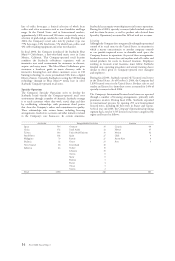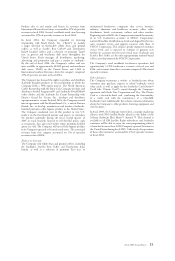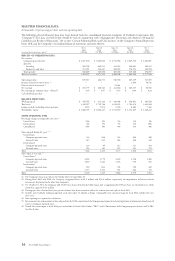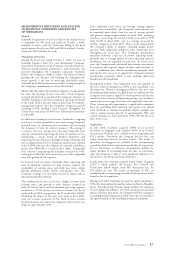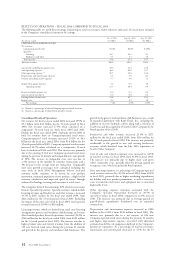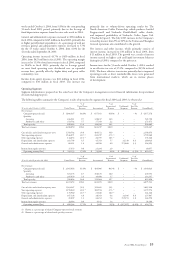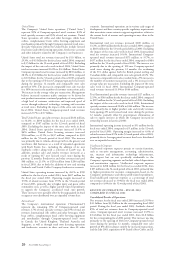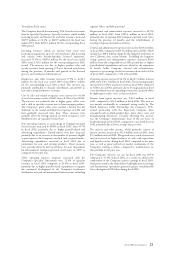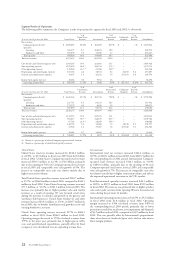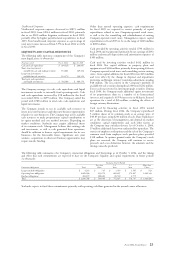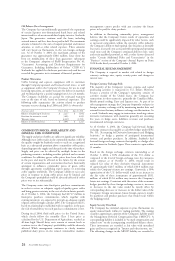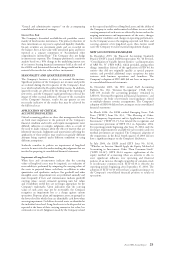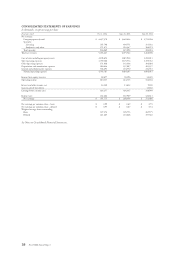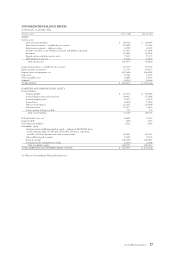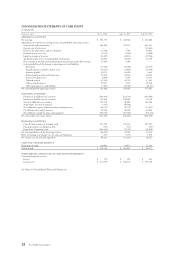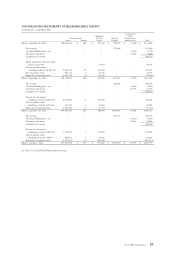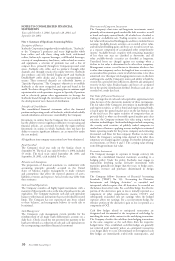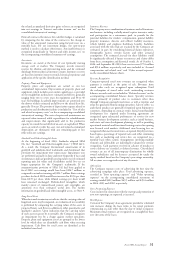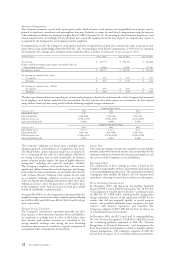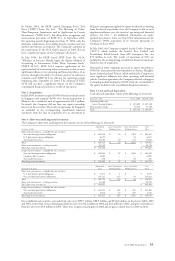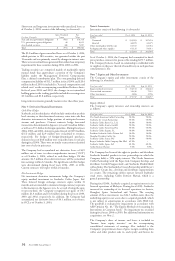Starbucks 2004 Annual Report Download - page 13
Download and view the complete annual report
Please find page 13 of the 2004 Starbucks annual report below. You can navigate through the pages in the report by either clicking on the pages listed below, or by using the keyword search tool below to find specific information within the annual report.
24 Fiscal 2004 Annual Report
Off-Balance Sheet Arrangement
The Company has unconditionally guaranteed the repayment
of certain Japanese yen–denominated bank loans and related
interest and fees of an unconsolidated equity investee, Starbucks
Japan. The guarantees continue until the loans, including
accrued interest and fees, have been paid in full. The maximum
amount is limited to the sum of unpaid principal and interest
amounts, as well as other related expenses. These amounts
will vary based on fl uctuations in the yen foreign exchange
rate. As of October 3, 2004, the maximum amount of the
guarantees was approximately $10.6 million. Since there has
been no modifi cation of these loan guarantees subsequent
to the Company’s adoption of FASB Interpretation No. 45,
“Guarantor’s Accounting and Disclosure Requirements for
Guarantees, Including Indebtedness of Others” (“FIN 45,”)
Starbucks has applied the disclosure provisions only and has not
recorded the guarantee in its statement of fi nancial position.
Product Warranties
Coffee brewing and espresso equipment sold to customers
through Company-operated and licensed retail stores, as well
as equipment sold to the Company’s licensees for use in retail
licensing operations, are under warranty for defects in materials
and workmanship for a period ranging from 12 to 24 months.
The Company establishes an accrual for estimated warranty
costs at the time of sale, based on historical experience. The
following table summarizes the activity related to product
warranty reserves during fi scal 2004 and 2003 (in thousands):
Fiscal year ended Oct 3, 2004 Sept 28, 2003
Balance at beginning of fiscal year $ 2,227 $ 1,842
Provision for warranties issued 5,093 2,895
Warranty claims (4,229) (2,510)
Balance at end of fiscal year $ 3,091 $ 2,227
COMMODITY PRICES, AVAILABILITY AND
GENERAL RISK CONDITIONS
The supply and price of coffee are subject to signifi cant volatility.
Although most coffee trades in the commodity market, coffee of
the quality sought by Starbucks tends to trade on a negotiated
basis at a substantial premium above commodity coffee prices,
depending upon the supply and demand at the time of purchase.
Supply and price can be affected by multiple factors in the
producing countries, including weather, political and economic
conditions. In addition, green coffee prices have been affected
in the past, and may be affected in the future, by the actions
of certain organizations and associations that have historically
attempted to infl uence commodity prices of green coffee
through agreements establishing export quotas or restricting
coffee supplies worldwide. The Company’s ability to raise sales
prices in response to rising coffee prices may be limited, and
the Company’s profi tability could be adversely affected if coffee
prices were to rise substantially.
The Company enters into fi xed-price purchase commitments
in order to secure an adequate supply of quality green coffee
and bring greater certainty to the cost of sales in future periods.
As of October 3, 2004, the Company had $271.7 million in
fi xed-price purchase commitments, which, together with
existing inventory, are expected to provide an adequate supply
of green coffee through calendar 2005. The Company believes,
based on relationships established with its suppliers in the past,
the risk of nondelivery on such purchase commitments is low.
During fi scal 2004, fl uid milk prices in the United States,
which closely follow the monthly Class I base price as
calculated by the U.S. Department of Agriculture, reached an
all-time high. Should dairy costs remain at current levels or
continue to rise, the Company’s profi tability could be adversely
affected. While management continues to closely monitor
published dairy prices on the related commodities markets,
management cannot predict with any certainty the future
prices to be paid for dairy products.
In addition to fl uctuating commodity prices, management
believes that the Company’s future results of operations and
earnings could be signifi cantly impacted by other factors, such
as increased competition within the specialty coffee industry,
the Company’s ability to fi nd optimal store locations at favorable
lease rates, increased costs associated with opening and operating
retail stores and the Company’s continued ability to hire, train
and retain qualifi ed personnel, as well as other factors discussed
under “Certain Additional Risks and Uncertainties” in the
“Business” section of the Company’s Annual Report on Form
10-K for the fi scal year ended October 3, 2004.
FINANCIAL RISK MANAGEMENT
The Company is exposed to market risk related to foreign
currency exchange rates, equity security prices and changes in
interest rates.
Foreign Currency Exchange Risk
The majority of the Company’s revenue, expense and capital
purchasing activities is transacted in U.S. dollars. However,
because a portion of the Company’s operations consists of
activities outside of the United States, the Company has
transactions in other currencies, primarily the Canadian dollar,
British pound sterling, Euro and Japanese yen. As part of its
risk management strategy, the Company frequently evaluates its
foreign currency exchange risk by monitoring market data and
external factors that may infl uence exchange rate fl uctuations. As
a result, Starbucks may engage in transactions involving various
derivative instruments, with maturities generally not exceeding
fi ve years, to hedge assets, liabilities, revenues and purchases
denominated in foreign currencies.
As of October 3, 2004, the Company had forward foreign
exchange contracts that qualify as cash fl ow hedges under SFAS
No. 133, “Accounting for Derivative Instruments and Hedging
Activities,” to hedge a portion of anticipated international
revenue and product purchases. In addition, Starbucks had
forward foreign exchange contracts that qualify as a hedge of its
net investment in Starbucks Japan. These contracts expire within
31 months.
Based on the foreign exchange contracts outstanding as of
October 3, 2004, a 10% devaluation of the U.S. dollar as
compared to the level of foreign exchange rates for currencies
under contract as of October 3, 2004, would result in
reduced fair value of these derivative fi nancial instruments
of approximately $20.7 million, of which $14.0 million may
reduce the Company’s future net earnings. Conversely, a 10%
appreciation of the U.S. dollar would result in an increase in
the fair value of these instruments of approximately $18.1
million, of which $12.6 million may increase the Company’s
future net earnings. Consistent with the nature of the economic
hedges provided by these foreign exchange contracts, increases
or decreases in the fair value would be mostly offset by
corresponding decreases or increases in the dollar value of the
Company’s foreign investment, future foreign currency royalty
fee payments and product purchases that would occur within
the hedging period.
Equity Security Price Risk
The Company has minimal exposure to price fl uctuations on
equity mutual funds within its trading portfolio. The trading
securities approximate a portion of the Company’s liability under
the Management Deferred Compensation Plan (“MDCP”). A
corresponding liability is included in “Accrued compensation and
related costs” on the accompanying consolidated balance sheets.
These investments are recorded at fair value with unrealized
gains and losses recognized in “Interest and other income, net.”
The offsetting changes in the MDCP liability are recorded in


